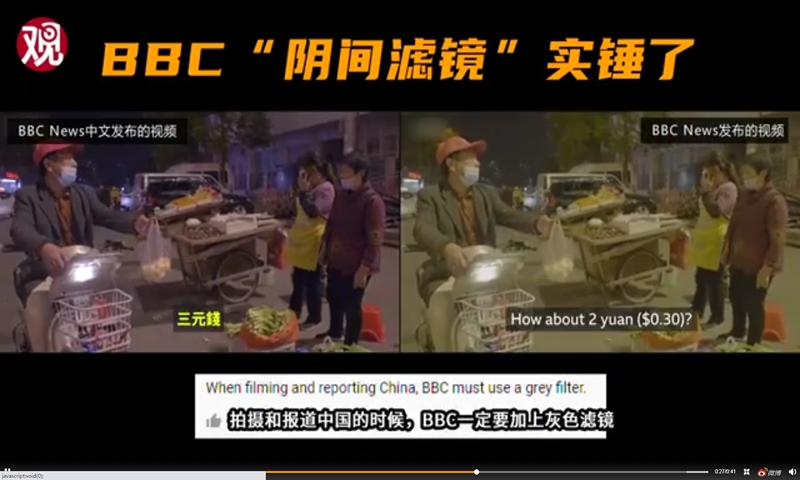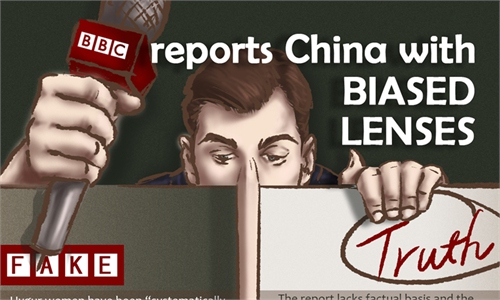
BBC News posted Chinese and English versions of a video titled "How everyday life has changed in Wuhan" on Youtube. Although the two versions have the same content, netizens found that a filter was added to the English version that made the footage more greyish. Photo: screenshot of video posted by guancha.cn on Sina Weibo.
A BBC video depicting the recovery of Wuhan, Central China's Hubei Province from the COVID-19 outbreak has drawn the ire of Chinese netizens for the addition of a grayish filter in its English version, turning scenes of vivid colors into a seeming "bleak underworld."
It prompted many to question the news outlet's integrity after what was seen as a deliberate attempt to misguide viewers and discredit China.
In December 2020, BBC News posted the Chinese and English versions of a video titled "How Everyday Life Has Changed in Wuhan" on YouTube. Although the two versions had the same content, netizens found that a filter was added to the English version that made the footage more grayish.
It soon drew a backlash among the public, with many questioning the BBC's intention in using such a trick. "Is it just me or are you using some kind of filter to make the colors in this video look old and give us a sense of the city looking poor?" read a comment. The comment had gained nearly 250 thumbs-up as of press time.
The topic "BBC using an underworld filter" trended on China's Twitter-like Sina Weibo in recent days. Some said that the depressing filter made the video look like a horror movie, while others pointed out that this is how double standards work in the West.
The language of the camera has always played an important role in helping viewers understand the message of the footage, Shen Yi, a professor at the School of International Relations and Public Affairs of Fudan University, told the Global Times on Wednesday. "However, the backlash from the Chinese public toward the BBC is because its use of filters misled the audience with excessive, intentional editing."
The BBC tried to portray China as a "police state" with no freedom but authoritarianism at every turn. It conveyed the message to Western viewers, who would naturally turn against China through such a misunderstanding, Shen said.
"By putting both versions of the video out at the same time, the BBC proves that it has long acknowledged the existence of ideological manipulation," Shen told the Global Times. "The BBC cannot be seen as a news organization if it does not commit to abandoning this hypocrisy."
A Chinese blogger, Damo Uncle, gained widespread recognition for making a video in early February mocking and exposing the BBC's tricks to distort news through camera angles and post-production techniques.
In a video, Damo Uncle showed how he used shots of garbage dumps, burning fires, symbols of infectious waste at an unknown location, and vehicles in a long queue to support a narrative of human experiments, virus leaks from labs and traffic jams due to people fleeing their homes.
To make it more convincing, he used editing programs to change the lighting of the clips, giving them a "hellish" touch.
China's National Radio and Television Administration has barred BBC World News from airing in China, it announced on February 12, saying some of its reports on China infringed on the principles of truthfulness and impartiality in journalism.

